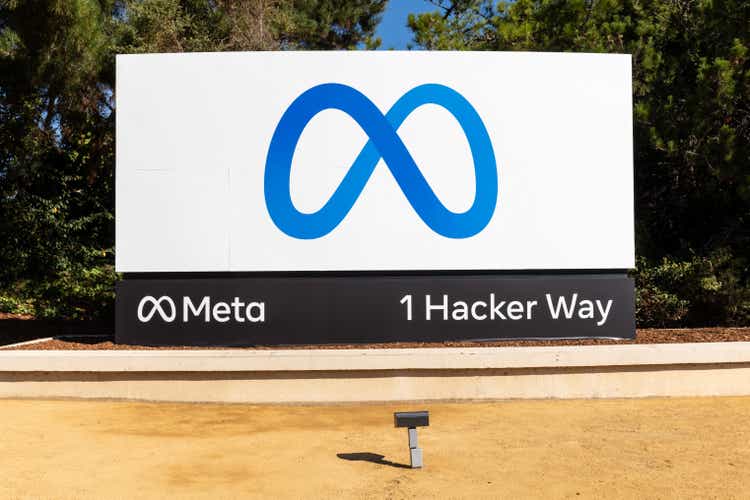Kelly Sullivan/Getty Images Entertainment
The following segment was excerpted from this fund letter.
Meta Platforms (NASDAQ:FB)
We have owned Meta (formerly known as Facebook) continuously since 2018. Since then, the Company’s revenues have nearly doubled, while returns on invested capital have consistently clocked in near the mid-to-high 20% range. At the end of the first quarter 2022, Meta’s stock traded near just 12 times forward consensus estimates, which is a substantial discount to the broad market and compared to Meta’s historical multiples.
We struggle to find businesses as dominant as Meta (which is why we have a focused portfolio in the first place). However, when a rare, dominant business trades down to such discounted multiples, we get aggressive with our positioning. At the end of the quarter, Meta was our top weighting.
Meta’s core value proposition is about matching advertisers up with the Company’s user base, which includes a staggering 2.8 billion daily users. We would hazard a guess that the only other applications with a daily user base as large as Meta’s properties are likely owned by Alphabet (GOOG, GOOGL), but Alphabet rarely discloses detailed user base data. The vast majority of Meta’s advertisers are small-to-medium sized businesses – more than 10 million of them.
In addition, over 160 million businesses use Meta’s free tools and services. Not long ago, it would have been inconceivable for any of these small businesses to have the ability to regularly reach an audience numbered in the millions. Of course, Meta offers this access to advertisers on demand.
To drive better returns for advertising customers as well as to improve the user experience for Meta’s various apps, Meta has been aggressively investing in artificial intelligence (AI). The Company recently revealed that it had built one of the world’s fastest supercomputers – its “AI Research Super Cluster” (RSC).
Supercomputers are typically utilized in academia, and barriers to building a supercomputer are often financial – we estimate Meta’s RSC likely cost several billion dollars. RSC would be one of the first privately owned systems that Meta will be using it for product development. It is important to note that AI has become the lifeblood of some key users’ experiences and advertising tools at Meta.
For example, Meta has developed a product recognition system that automatically tags and serves up visually similar products on Marketplace to help make photos more attractive and relevant to shoppers.1 Shopping on Meta’s various properties is a massive addressable market that could drive new revenue streams and expand the value proposition for advertisers.
Another example of Meta’s use of AI is in content curation, particularly around harmful content. Meta has an AI system that has been trained on policy-violating content – which Meta has labeled and amassed over the years – and can thus flag misleading or sensationalized content.2
Of course, not all of Meta’s AI investments will be directed at the core business. The Company recently named and broke out a “Reality Labs” segment, which generates very little revenue, and serves mostly as a long-term “bets” segment, not unlike what Alphabet has been doing for years. While it is nice to know Meta is interested in developing an alternative to smartphones, this segment is not a core component of our long-term Meta investment thesis.
More telling were the core financials of Meta’s Family of Apps business, with segment operating earnings clocking in at a breathtaking +49% in the most recent quarter. We understand the focus on Meta’s competition, but in our experience, companies that exhibit GAAP margins of 49% are not having much trouble competing, rather quite the contrary. In fact, Meta has not made a material acquisition since 2014, so virtually all the Company’s growth has been organic over the past 7 years.
We welcome Meta’s continued investment in new products, with its more recent focus on reels, which we think adds yet another function to the Family of Apps that will drive user engagement and long-term value for shareholders.
FOOTNOTES
1 Advancing AI to make shopping easier for everyone
2 Harmful content can evolve quickly. Our new AI system adapts to tackle it.
Editor’s Note: The summary bullets for this article were chosen by Seeking Alpha editors.




